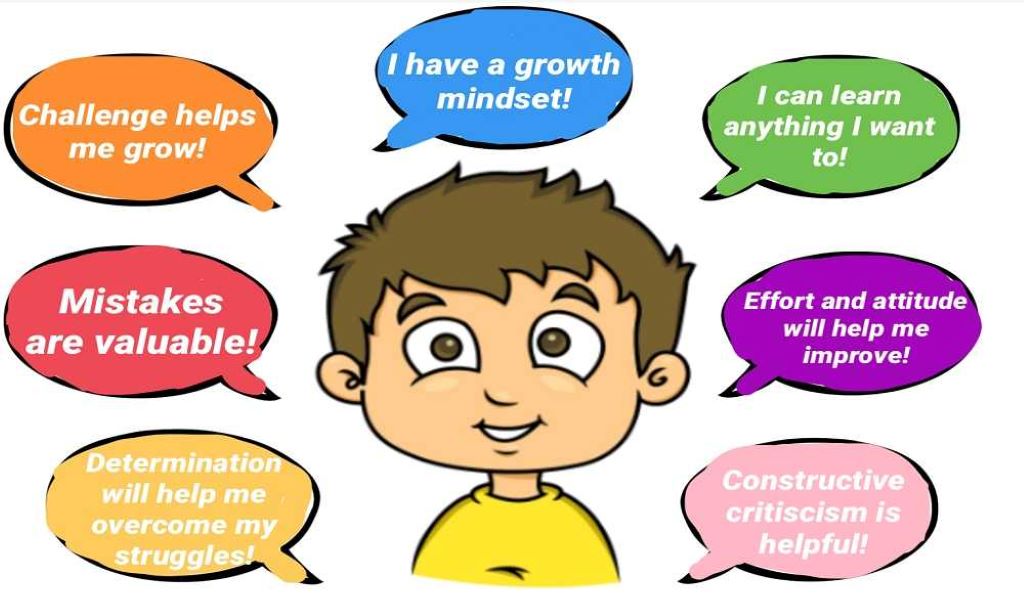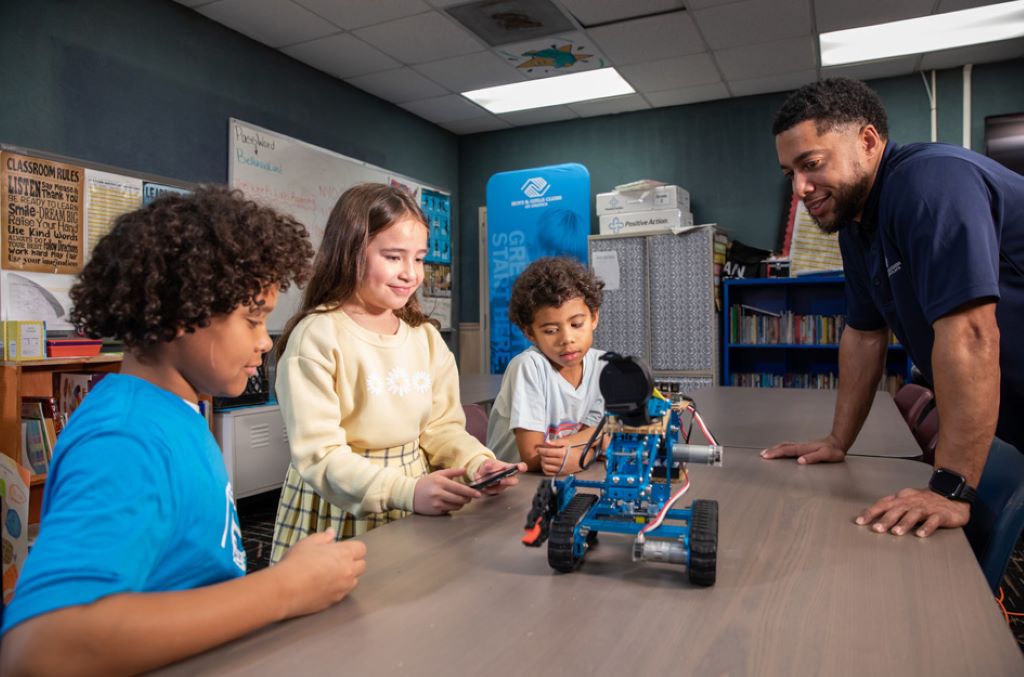
17 Feb How to Encourage a Growth Mindset in Your Child?
As a parent, you want your child to reach their full potential and succeed. One of the most powerful ways to set them up for success is by nurturing a growth mindset. A growth mindset is the belief that abilities and intelligence can be developed through effort, learning, and persistence. It creates a love of learning and resilience that allows children to thrive. Here’s how to encourage a growth mindset in your child.
What Is a Growth Mindset?

Psychologist Carol Dweck pioneered research on fixed versus growth mindsets. People with a fixed mindset believe intelligence and talents are innate. You either have them, or you don’t. People with growth mindsets believe abilities can be improved through hard work, good strategies, and input from others.
How we praise and interact with our children plays a huge role in their developing mindset. When we praise only traits and talents, children learn these are fixed. For example, telling a child, “You’re so smart,” conveys that intelligence is innate. Emphasizing effort and persistence promotes a growth mindset. Telling a child, “You worked so hard on that math test,” highlights that practice and strategy lead to improvement.
Why a Growth Mindset Matters
Children who develop growth mindsets are more motivated, resilient, and successful. They view challenges as opportunities to improve, not signs of permanent failure. Growth mindsets lead to:
- Greater persistence through obstacles
- Trying new strategies when stuck
- Seeing effort as the path to mastery
- Learning from criticism instead of being discouraged
- Taking on challenges to expand abilities
Children with fixed mindsets are likelier to give up easily, avoid challenges, and feel threatened by others’ success. Instilling a growth mindset early helps children reach their potential at school, at home, and in life.
6 Ways to Cultivate a Growth Mindset
Promoting a growth mindset takes intentional parenting choices. Here are six powerful ways to nurture this attitude in your child.
1. Praise effort and strategies, not innate talent.
The way we praise shapes children’s mindsets. Try toasting the process over the results. For example:
- “I like how you tried all kinds of strategies on that math problem until you finally got it!”
- “I love seeing the effort you put into practicing that piece on the piano.”
- “It was amazing seeing how you stayed focused and kept trying different things.”
Avoid praising talents and traits, which implies these can’t change. For example, don’t say, “You’re so smart at math!” Praise the effort instead: “Your hard work and strategies are paying off in math!”
2. Encourage a love of learning and challenges.
Children with growth mindsets get excited about learning new things, not anxious. Show your enthusiasm for taking on challenges, learning new skills, and expanding your horizons. Share stories of how you or others have developed abilities through practice.
Let your child know even geniuses have to work hard. Explain how their brain is like a muscle that gets stronger through exercise. Emphasize that we learn more from challenging ourselves than from easy success.
3. Teach that the brain is malleable.
Explain to your child that the brain works like a muscle that changes and strengthens through learning. Here are some simple examples you can use:
- Exercising stretches and grows muscles. Practicing new skills stretches and develops the brain.
- Difficult things feel hard at first. But over time and practice, they get easier. The brain forms new connections.
- Mistakes mean you’re challenging yourself. The brain learns best when pushed past comfort zones.
Use analogies they understand, like training to run a race or lift heavier weights. The key is teaching that their brain can grow smarter through hard work.
4. Model your growth mindset.
Children are sponges who notice and mimic everything we do. Let them see you trying new things, taking on challenges, and hearing “no” or failing. The voice that mistakes provides opportunities to improve. Show them that effort leads to meaningful growth.
For example, learn a new hobby together. Say, “That recipe didn’t turn out like I hoped. What could I try differently next time?” Let them see you actively strengthening your abilities.
5. Praise their effort and attitude, not grades.
Well-intentioned parents often place too much emphasis on grades as the definition of success. This communicates that grades, not learning, are most important.
Instead, focus your praise on the process. Celebrate their effort, willingness to try new approaches, focus, and attitude. Empathize with their frustration when they struggle. Help them see setbacks as growth opportunities, not failures.
6. Encourage practice, strategy, and mentors over “natural” ability.
Top performers in sports, music, art, and academics all rely on practice and good coaching. Emphasizing skills takes time and effort to cultivate. Help them analyze their learning process. Identify areas needing improvement and figure out strategies for growing.
Seeking out mentors shows the desire to learn. Introduce them to people who have developed strong skills through determined effort. There are always new heights to climb if we keep pushing ourselves.
How to Handle Setbacks
All children inevitably face setbacks that threaten their sense of competence and growth. Children with fixed mindsets see these as evidence they don’t have “what it takes.” Those with growth mindsets use them as fuel to improve.
Pay close attention to your child’s self-talk when challenges arise. Step in and reframe negative self-talk. Emphasize they can improve if they stick with it.
Here are constructive ways to handle common setbacks:
When they get frustrated struggling with a skill:
“This is your brain growing! Remember how hard reading felt at first? With practice, you got better. You can learn this skill too if you keep at it.”
When they say they’re just not good at something:
“You’re still learning this. No one starts great. You should have seen some of my early drawings! If you keep practicing new techniques, you’ll surely get better.”
When they want to give up after a failure:
“Experts often fail before they succeed. Think about Thomas Edison trying thousands of times before inventing the lightbulb. This shows you’re challenging yourself! Next time, try [specific strategy], and I know you can do it.”
When they get discouraged comparing themselves to others:
“We all grow at our own pace. Instead of comparing yourself to others, focus on improving yourself. Every great athlete started at the bottom and worked up through practice. You can, too, if you keep at it!”
Reinforce that they can change. The key is shifting their perspective from judging their traits to improving their strategies.
Fostering a Growth Environment
In addition to your praise and messaging, the learning environment you create impacts your child’s mindset. Here are some elements to include:
Give just-right challenges.
Children need tasks that stretch their abilities without overwhelming them. This “sweet spot” of challenge keeps them engaged and growing, not frustrated.
Provide an array of challenging activities to help them find their zone. For more significant challenges, break them into smaller steps. Increase difficulty gradually as their skills improve.
Allow mistakes and failures.
Children with growth mindsets see mistakes as learning tools, not signs of failure. Give them space to explore, test limits, and make errors without judgment. View mistakes as data so they can adjust strategies.
Praise them for taking risks and having the courage to fail. Emphasize what they can learn from the experience to improve next time.
Encourage collaboration, not competition.
Environments where children compete for rank and rewards can undermine growth mindsets. Cooperation and teamwork foster learning, risk-taking, and growth.
Give group challenges rather than singular performance goals. Have them share strategies with peers. Point out how we learn from each other’s strengths and ideas.
Focus on the process, not perfection.
Children must know it’s not the end product or performance but the learning journey. Recognize effort and improvement along the way.
Don’t over-praise talent or easy success. Applaud challenging themselves, using new strategies, focusing, practicing, and improving. The process itself leads to meaningful growth.
Maintaining Your Mindset

To instill a growth mindset in our kids, we have to model it ourselves. Check in on your praise, reactions to failure, and self-talk. Just like no parent is perfect, no one always has a growth mindset. Awareness of our mindsets helps us consistently encourage the attitudes that lead to achievement and fulfillment.
The growth mindset approach will soon become second nature with persistence and practice. You’ll notice your child’s increasing resilience, willingness to take on challenges, and love of learning. Your support and guidance through the process is the greatest gift you can give.
Frequently Asked Questions
Q: What if my child is naturally gifted in some areas? Won’t too much praise or effort undermine their talents?
A: Children with natural talents can develop fixed mindsets if overly praised. Striking a balance is critical. Acknowledge their abilities while still emphasizing effort, focus, and good strategies. No matter how gifted, every child has room to grow. Praise the process and remind them even extraordinary talent requires hard work.
Q: I want to boost my child’s self-esteem. Isn’t it good to praise them lavishly?
A: While it’s important to encourage your child, overly effusive, trait-focused praise can backfire by fostering a fixed mindset. Rather than indiscriminate praise, focus on specific behaviors that reflect growth: effort, focus, persistence, willingness to learn from mistakes, etc. Process praise gives them concrete areas to improve.
Q: My child tends to be hard on themselves when struggling. How can I reset their self-talk?
A: Children internalize the messages we give them. When they get down on themselves, don’t reinforce the negativity. Remind them of times they persevered through practice. Emphasize they can improve if they keep trying new strategies. Reframe the challenge as an exciting opportunity to grow, not a demoralizing failure.
Q: Are some kids just born with fixed mindsets?
A: Mindsets take shape very early on but are malleable. Even children with strong fixed mindsets can develop growth mindsets when parents emphasize improvement over talent. Consistent messages about the power of effort and practice can reshape their beliefs. Mindsets are learned attitudes, not fixed personality traits.
Q: I’m naturally more of a fixed-mindset thinker. How do I shift to model growth mindsets for my child?
A: We all gravitate toward certain mindsets. The key is awareness. Catch yourself praising talents versus effort, talking about “being bad” versus working to improve, etc. Commit to shifting the narrative in your home by reinforcing that abilities can be developed. Your growth mindset will blossom with practice.
The most important thing is consistently emphasizing the power of effort, learning from mistakes, and strategies over innate, fixed ability. Your encouragement and belief in their potential to grow through challenges will instill a lifelong growth mindset.
Conclusion
Instilling your child with a growth mindset lays the foundation for achievement and fulfillment. They’ll be more resilient, embrace challenges, persist through obstacles, and reach ever-higher levels of learning. Research shows children who adopt growth mindsets outperform their peers academically and bounce back more quickly from adversity.
But change starts with you and how you praise, interact, and model mindsets at home. Discover the power of success with effective study techniques; where minor tweaks make a big difference over time, celebrating effort and attitude, embracing mistakes as progress, emphasizing the brain’s capacity to grow brighter, fostering cooperation over competition, and making the journey towards improvement, not perfection, what matters most.
Your support of their journey to challenge themselves, work hard, and reach their full potential will empower their success beyond childhood. A growth mindset helps shape motivated, confident lifelong learners poised to thrive.

Sorry, the comment form is closed at this time.